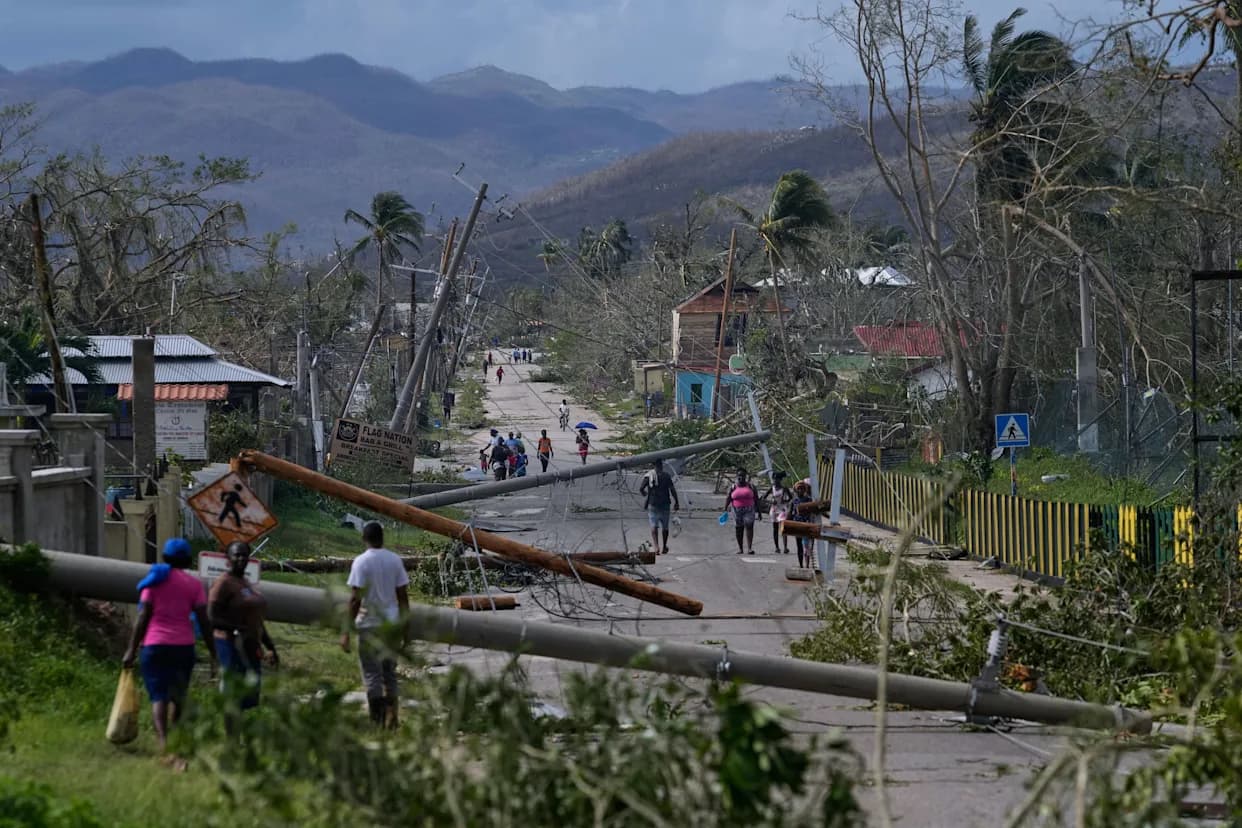We're loading the full news article for you. This includes the article content, images, author information, and related articles.
The Category 5 storm, Jamaica's strongest on record, has caused widespread devastation and triggered a major international relief effort as it now tracks towards Bermuda.

Hurricane Melissa, the strongest hurricane to make landfall in Jamaica's recorded history, has left a trail of devastation across the island nation, with the overall death toll in the Caribbean rising to at least 44 as of Thursday, 30 October 2025. The storm struck Jamaica's southwestern coast on Tuesday, 28 October 2025, as a catastrophic Category 5 hurricane with sustained winds of 185mph (295km/h).
Jamaican officials report at least 19 fatalities, but search and rescue operations are ongoing in isolated communities. Information Minister Dana Morris Dixon confirmed the rising toll, while Transport Minister Daryl Vaz described the damage as “enormous.” Many towns in the southwest were left underwater, with extensive damage to power lines, mobile networks, and infrastructure. Prime Minister Andrew Holness noted the “total devastation” across the island, with reports of 80-90% of roofs destroyed in some coastal towns like Black River.
The storm also caused significant damage in Haiti, where authorities reported at least 25 deaths, many occurring after a river flooded its banks in the southern town of Petit-Goâve. After crossing Jamaica, Melissa passed over eastern Cuba and the Bahamas, prompting large-scale evacuations but with no immediate reports of fatalities in those areas.
The international community has launched a significant relief operation. Kingston's main international airport has reopened to allow aid flights to land. The United Kingdom's government has pledged £2.5 million in emergency humanitarian funding and is chartering flights to help British nationals return home. The United States is deploying a Disaster Assistance Response Team (DART), including urban search-and-rescue units, to Jamaica, Haiti, the Bahamas, and Cuba. Canada has announced $7 million in humanitarian assistance for the region.
United Nations agencies are coordinating a major response. The World Food Programme (WFP) is managing a sea-lift operation from Barbados to deliver supplies and has pre-positioned over 800 metric tons of food in Haiti. The International Federation of Red Cross and Red Crescent Societies (IFRC) has launched an emergency appeal for 19 million Swiss francs to assist 180,000 people in Jamaica. The Jamaica Red Cross has mobilized 400 volunteers to distribute pre-positioned relief items.
As of Friday morning, 31 October 2025, Hurricane Melissa had weakened to a Category 2 storm but was moving towards Bermuda, where a Hurricane Warning is in effect. The Bermuda Weather Service forecasted the storm to pass northwest of the island, with residents urged to finalize preparations.
The unprecedented intensity of Hurricane Melissa aligns with scientific consensus that climate change is fueling more powerful tropical cyclones. Warmer ocean temperatures provide more energy for storms, leading to higher wind speeds, increased rainfall, and a greater likelihood of rapid intensification. The Intergovernmental Panel on Climate Change (IPCC) has expressed high confidence that human-caused climate change has increased extreme rainfall from cyclones. This trend of more destructive storms presents a critical global challenge, with significant implications for vulnerable regions worldwide, including East Africa.
While there are no official reports from Kenya's Ministry of Foreign Affairs regarding Kenyan citizens affected by the hurricane, the disaster serves as a stark reminder of the urgent need for climate adaptation and resilience. Kenya and the East Africa region are highly vulnerable to extreme weather events, such as droughts and floods, which are also intensifying due to climate change. The devastation in the Caribbean underscores the importance of robust early warning systems, disaster preparedness infrastructure, and international cooperation in managing climate-related crises. The strong cultural and diplomatic ties between Kenya and Jamaica, reinforced by President Uhuru Kenyatta's 2019 state visit, add a layer of solidarity and shared concern in the face of such climate-driven catastrophes.
Keep the conversation in one place—threads here stay linked to the story and in the forums.
Sign in to start a discussion
Start a conversation about this story and keep it linked here.
Other hot threads
E-sports and Gaming Community in Kenya
Active 9 months ago
The Role of Technology in Modern Agriculture (AgriTech)
Active 9 months ago
Popular Recreational Activities Across Counties
Active 9 months ago
Investing in Youth Sports Development Programs
Active 9 months ago